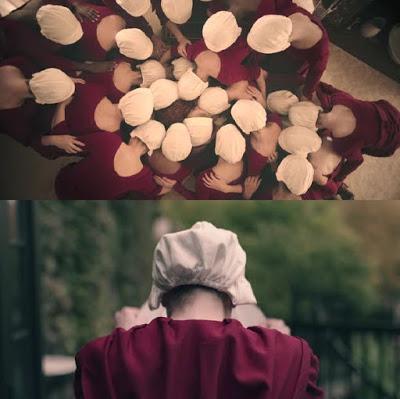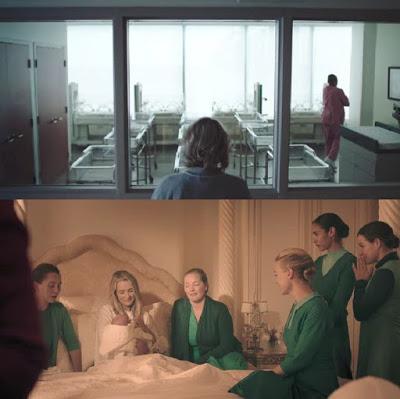 The Handmaid’s Tale : 1x02 Birth Day.
The Handmaid’s Tale : 1x02 Birth Day.How do trust, empathy and companionship work in the world of Gilead? We’ve seen many examples in the first episodes of how they are almost impossible, as the regime sustains itself on the fact that everyone is kept in check by everyone else, that constant surveillance isn’t even necessary anymore once it is always assumed, that a cornerstone of the ideology is that women condemn other women for their behavior whenever it transgresses, so that an alliance that might strive for freedom can never be formed. This is why it was such a glorious moment when June realised that Ofglen was a person with just as much of an authentic inner life as herself – in a world that denies the possibility that women are people, recognising another woman as a person with a secret inner life and the capacity for emotions and thoughts is a revolutionary act. It is such a transgressive act that June in the beginning of this episode almost floats out of the house, carried by the beautiful knowledge that she has finally found a companion out there in Ofglen. And then the show turns this around on her, in many ways. The revolution that June has enjoyed is that of two people connecting as such, it is the rebellion of a trusting friendship in which information can be shared without worry. This is what she is looking forward to when she opens the gates to walk again with Ofglen – being able to talk like human beings instead of exchanging empty phrases and pretending to be hollow. But Ofglen is already many steps ahead – what June thought was a proposed friendship, something that may help her to maintain her mental health, was in fact an attempt to recruit her into an “us”, a secretive networks that is collecting information on the very men that the Handmaids serve. The “we” that existed in June’s head was that of her and Ofglen, stealing away a tiny bit of intimacy away from a world that denies them even that much – but the “we” that Ofglen is part of is bigger, political, striving for change. This fact demands much of June. It means that she has to reconsider her stance as a profoundly (and I assume we will see more of this, in future episodes) apolitical being who verbalises her thoughts in terms of the personal, not the political. It means that she has to consider whether she really isn’t the kind of person that would join such a group, or think of this in greater terms than that of personal survival to see her daughter again (because what if that thought alone only contributed to the continued existence of Gilead, because its atrocities demand a wider, less individualistic view?).
Her decision regarding Ofglen’s proposition happens through the lens of two other events. One is a very public one, a ritualistic birth – Janine giving birth to her Commander’s child, and everything that is connected to that birth – and a very personal one, after the driver delivers a message to her that Commander Waterford wishes to speak to her in his office this night, a transgression on his part, as she is never meant to be alone with him.
The thing that works so well about The Handmaid’s Tale as a show is how it portrays its characters navigating questions of freedom and trust, and how, oftentimes, that navigation has to happen through facial expressions alone, as so many social interactions are sanctioned, or deeply formalised, to make authentic human exchange impossible. There is a lot of that, throughout the birthing ritual – the absurdity of it, with the wife pretending to go through the same ordeal, surrounded by other hopeful wives wishing for nothing more than that the same thing may happen to them, and the Handmaids surrounding one of their own who has finally fulfilled her sole purpose (the background to both of these is – the jealousy of those left behind, who haven’t made it yet – and to the latter specifically, the question of what the purpose of the Handmaid is once the baby is delivered and no longer needs to be fed). June and Serena Joy dance around each other – and this happens in an episode where so many other characters, especially Ofglen and the Commander, look at June to decide if she is human, to make that judgment. When Serena Joy looks at her, she fears that she may in fact be more like herself than she allows herself to permit, because of what that would say about their arrangement, and what this regime is asking of both of them. There couldn’t be anything more terrifying for Serena to believe than that June is as human as she is, and that she must be taken seriously. When she asks her for news about the other, actual birth, it is like she is asking her to be a performer in front of the other wives, one of which treats her like a small child, or perhaps a good dog. Serena Joy isn’t stupid enough to think that June is anything like either, and the way that she feeds her the cookie is more like you would extend your hand to a feral animal, expecting to be bitten, maybe proving a point about power and domestication.
The other way in which the episode approaches the birthing ritual is through the lens of June’s own memory of giving birth. When she is driven to the hospital, there is a crowd of journalists and praying bystanders. When she has successfully delivered a healthy and beautiful girl, she finds out that this was the only healthy birth, and that the rest of the maternity ward is hauntingly empty. The nurse uses phrases that – to us, who know where this will lead – are painfully familiar – “praise be”, etc., hinting that the seeds were planted long before any of this escalated, that the beginnings were innocent, a supportive nurse, that all of this grew from the horrors of a world so destroyed by humanity that there were no more babies. June draws that conclusion in her head, when she remembers the horrifying moment of a woman trying to steal her baby, shortly after her birth, and sees the wives deeply involved in their fundamentally ridiculous ritual, the way in which all of this only works if there is an illusion that the children are theirs, that their heirs are theirs and not the product of a socially accepted mass rape of other women.
All of this influences her decision of whom to trust. Ofglen says there is an eye in her household, and proposes a network, an other to what seems to her an unescapably, all-seeing regime. The driver warns her of Ofglen and warns that she is dangerous (Ofglen quips that she may as well be, as a “muff-munching gender traitor”). The beauty of the show is that in the end, there can only be that one decision. She knows she can toy with the driver, and plays with that option, realising as so many other have done that in a society as fucked up about sex as this one, there is still one currency that remains to her. But when she goes and knocks on the door of the Commander, she has already made her mind up, and uses the fact that this is his transgression as much as hers as an opportunity to gather evidence. This is the first time that these two have been on their own together. Throughout the controversy before the show started, there was an odd argument about the definition of “feminism”, and what it entails, as if the mere fact that the show is also interested in how all of this affects the man means that the show isn’t explicitly feminist. The Commander has all the privilege that this world has to offer, and his actions make a world possible in which all women, without exception, are subjugated, and still, he has lost something too – the ability to interact with women as if they were people. His wife isn’t a companion, because they are caught up in a deeply alienating charade that presumably makes their marriage a living hell. He coaxes June to reveal herself as a human being, of sorts, by inviting her to play Scrabble, where she proves herself to be intelligent (if a bit rusty). It’s perfect that he chooses Scrabble, in a world where reading and writing is forbidden to women, and it’s perfect because June used to work for a book publisher, and loves words enough that she gently touches the tiles, remembers. She allows her own voice to be heard – a danger, trusting that the Commander’s transgression is enough to keep her safe in that moment, that somehow, all of this has given her back some power. He needs something from her that only she can provide (the other side to this is that she may need something that he can provide, as well, a dangerous proposition).
In either case, in the end, it doesn’t matter. The walk to the gate frames the episode – the first one is the exhilarating walk of someone who has found a friend in a world that should make companionship impossible, the second one is that of a woman who has found power again, and has made a decision about being a political person. But the face that turns towards her in the end isn’t that of the Ofglen she knows. “I am Ofglen”, the complete stranger replies.
Random notes:
 There is a very clear sense in this episode that in the end, it all comes down to empathy, and as much as June hates Janine – for the way she told her about Moira, for how she gloated, for how her insanity is a very clear warning to what could happen to any of them – in the end, she can’t help but feel for her when the loss of her child hits her. They connect over being mothers, and in that moment, there is nothing that the Aunts or the Wives could do to sever that connection. It is odd, for a society so keen on playing everyone against everyone else, that its ritual so deeply rely on communal experiences – as much as the dark side of that is implicating everyone in violence, it also holds the possibility of effective opposition, of emotions that can never be truly and completely controlled.
There is a very clear sense in this episode that in the end, it all comes down to empathy, and as much as June hates Janine – for the way she told her about Moira, for how she gloated, for how her insanity is a very clear warning to what could happen to any of them – in the end, she can’t help but feel for her when the loss of her child hits her. They connect over being mothers, and in that moment, there is nothing that the Aunts or the Wives could do to sever that connection. It is odd, for a society so keen on playing everyone against everyone else, that its ritual so deeply rely on communal experiences – as much as the dark side of that is implicating everyone in violence, it also holds the possibility of effective opposition, of emotions that can never be truly and completely controlled. The slight change in the story here – with the attempted kidnapping of Hannah happening right in the hospital, rather than later, in a supermarket – works very well, especially with the stark contrast between the birthing experience as it used to be (in a hospital, with a nurse) to as it is now (in a private house, communally, with an Aunt).
The layers and layers of the Commander’s Wife in this episode are among my favorite acting so far in this show, which has been completely outstanding. Elisabeth Moss, in every scene, from the deep moment of connection with Janine to the way she plays the Commander’s game at the end, to the moment right after, the absurdity, the horror, to humor of it. But I think one of the most unexpected revelations here was Alexis Bledel’s Ofglen, who I wish we had had a chance to know much more than this.
Also, the music in this. And the camerawork, always alternating between the very personal under-the-wings shot and the birds-eye of Handmaids, moving in unison.

